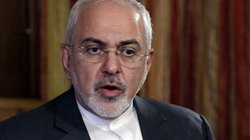 Foreign Minister Mohammad Javad Zarif has referred to a statement issued by Washington to refute allegations made European signatories of the 2015 nuclear deal claiming Iran's missile activities have violated the deal.
Foreign Minister Mohammad Javad Zarif has referred to a statement issued by Washington to refute allegations made European signatories of the 2015 nuclear deal claiming Iran's missile activities have violated the deal. RNA - "Brian Hook (US Special Representative for Iran) has given our E3 JCPOA partners a timely reminder, openly admitting that missile testing is NOT prohibited in Security Council Resolution 2231," the foreign minister said in a tweet on Friday.
Zarif quoted a statement made by Hook during a State Department briefing on Thursday which said, "One of the deficiencies of the Iran nuclear deal is that it ended the prohibition on Iran's ballistic missile testing."
Zarif's Friday remarks came in response to a letter authored by the European signatories of the deal, comprised of France, Germany and Britain, which circulated on Wednesday.
The letter, addressing UN Secretary General Antonio Guterres, accused Tehran of possessing “nuclear-capable ballistic missiles”.
The letter claimed that Iran's latest missile activities were “inconsistent” with UN Security Council Resolution 2231 that endorsed the accord in 2015.
On Thursday, Zarif rejected the European accusations as a "desperate falsehood" seeking to cover up the EU3's "miserable incompetence" in fulfilling their commitments under the accord.Zarif also posted a letter written by the head of Iran's mission to the United Nations Majid Takht Ravanchi sent to Guterres detailing a legal response to the European accusations.
Ravanchi argued that Iran's activities “related to space launch vehicles and ballistic missiles fall outside of the purview of competence of Resolution 2231 (2015) and its annexes.”
Washington withdrew from the multilateral nuclear deal, officially known as the Joint Comprehensive Plan of Action (JCPOA), in May 2018 and reimposed harsh sanctions against Iran.
The Trump administration made the move demanding a “new deal” that would limit Iran’s defensive missile capabilities and regional anti-terrorism and defense cooperation with its regional allies.
At the time, European signatories of the deal vowed to make efforts to counter Washington’s sanctions and shield their trade relations with Tehran.
Those promises, however, were never delivered as Europe gave in to America’s pressure.
Tehran has since responded by reciprocally suspending its nuclear obligations as permitted by the JCPOA and pledged to go further if other signatories do not uphold Iran's rights under the deal.
847/940